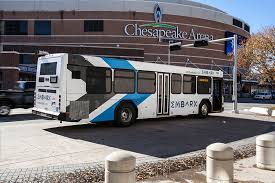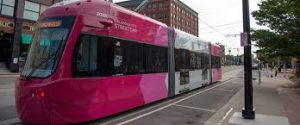
Ridership on Oklahoma City’s public transportation has taken a hit because of the coronavirus pandemic with March numbers down nearly 13%.
When COVID-19 struck Oklahoma in mid-March, ridership at EMBARK, formerly Metro-Transit had been on the increase from a year earlier. January ridership was more than 210,000 combined for a 2.3% increase from January 2019. February numbers were up more than 2% at about 196,000 from a year earlier but then the pandemic struck and restaurants, hotels and other businesses were closed and the public stopped traveling.
March ridership went from 203,733 in March 2019 to 177,362 in March 2020. Remember, the pandemic scare didn’t hit Oklahoma City until March 11 when the NBA game between the Thunder and the Utah Jazz was postponed at the Chesapeake Arena. That’s when riders stopped taking EMBARK transportation.
Michael Scroggins, Manager of Marketing and Technology for EMBARK said the average daily ridership on city buses went from nearly 9,000 in February to slightly more than 8,000 in March, a nearly 17% drop.

Fares provide about 9% of EMBARK’s budget or $3.2 million. But that’s not the area of concern for Scroggins who supplied charts and figures on ridership.
“You’ll see that the General fund is our most significant funding source for public transit. Because the General Fund is mostly reliant on sales tax, declining sales tax in the coming months will have a much more significant impact on budgeted revenues than current declines at the farebox,” he explained in an email to OK Energy Today.
The General Fund makes up more than $23 million or 63% of the bus systems total budget of nearly $37 million.
“….the OKC ridership data, the number of trips on transit is down significantly. Farebox revenue is an important revenue stream for transit operations. So when OKC ridership is down, revenue dips, too. It is important to remember that for most transit systems, farebox revenue is one of several funding sources,” he added.
The Oklahoma City Public Transportation division is funded through sales tax, $7.6 million in federal funding, $1 million from the State and $1.7 million other.
But with reduced ridership and other changes brought about because of the coronavirus, Scroggins and other city leaders are monitoring the impact on their budgets.
“We have reduced service spans, for the benefit of protecting our workers, but we will also see reduced expenses too as a result of less maintenance and fuel for the bus fleet. Currently, we are examining ways to leverage funding allocated to transit through the Federal CARES act to preserve service, even though sales tax revenues will likely be down.”
But Scroggins isn’t ready to halt public transportation in the city, far from it as he credits the City Council and EMBARK’s board for closely monitoring the developments related to the pandemic.
“Through their continued engagement and acute awareness of our operating environment, the decisions we make today will help ensure that we can return to normal service levels when appropriate.”





